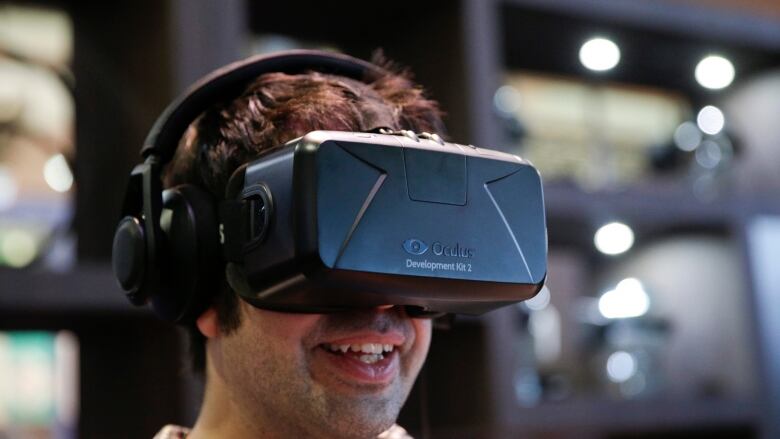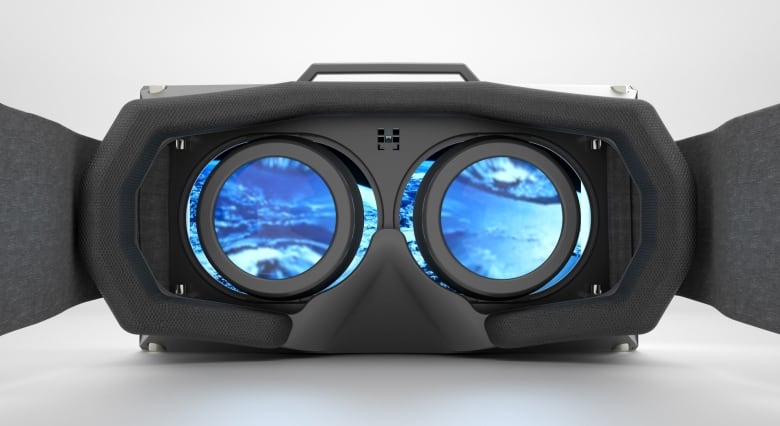Virtual reality may not be ready for prime time just yet
Big buzz at CES, but price and lack of content may prevent VR headsets from going mainstream this year

Among themost-hyped gadgets at this year's Consumer Electronics Show the annual major trade show in Las Vegasarevirtual reality headsets.
But according to CBC technology columnist Dan Misener,VR might not be ready for primetime just yet.
How big a deal is VR at this year's Consumer Electronics Show?
It's a very big deal, with thegaming and virtual reality section much larger than in past years. There will be 46 different exhibitors showing off different VR technologies.
The Consumer Technology Association, which organizes CES, has forecast 1.2 million VR headset sales for this year.

Pre-orders for the Oculus Rift headset begin during this year's CES.
Virtual reality is also coming to console gaming, with Sony launching Playstation VR later this year.
All of which means 2016 is shaping up to be the year of mass-market virtual reality. And that means people will be looking to this year's CES for some indication as to whether or not people will buy VR hardware as it becomes available.
What kind of computer do I need in order to use a VR headset?
A pretty powerful one, in fact.
Recently,Nvidia which makes graphics chips said that very few computers have enough power to actually drive a VR display.
Toronto VR designerStephan Tanguayagrees.
"You need a pretty decent machine," he said. "All the components that youprobably are going to need are on the very new side. So unless you built a PC in the past six months, specifically for gaming, [Nvidia]are right."
Nvidia estimates that about 13 million home computers this year will support VR which isfewer than one per cent of the computersin use around the world.
So while there's ahuge amount of buzz and hype around virtual reality, there are relatively few computers that can support it.
How has the developer community reacted?
VR designer Blair Renaud, who ismaking a cyberpunk game called Technolustfor the Oculus Rift, saidhe's not worried about Nvidia's estimate that "only"13 million computers could possibly run his game in the next year.
"I tell you, if I could sell 13 million copies of something, I'd be quite happy," he said."That'splenty."
It's seemed for a while now that a major breakthrough in consumer adoption ofVRhas been "just"around the corner" and designers across Canada, like Renaud, arebetting the market will grow significantly in the next few years.
Beyond the technical aspects, what other challenges does virtual reality face?
Price is a big factor.
If VR headsets are going to become a truly mass-market piece of consumer electronics, people have to be able to afford them. Most VR headset makers have not yet said how much they will be charging for the devices.
Another major challengeis creating things to use the hardware for, says Blair Renaud.
"We need a lot more content," he said. "And we need to figure out what the right content is... what people want to play. What'sa good VR game?"
Will 2016 be the year VR goes mainstream?
2016 is probably not the year for mass adoption of VR.
It's still very much in the "early adopter" phase, and games and gamers will push things forward.
Hardcore gamers are the people who most likely already have a powerful computer that can drive a VR headset.
But2016 is going to be the yearVR headsets will become much more widely available. And that means more people will have the opportunity to try a VR headset.
So consumer awareness is going to go up significantly, but consumer adoption if it happenswillneed to wait a few more years, untilprices to come downand the catalog of content gets bigger.
And that, Renaud says, is where the immediate problem in adoption may lie.
It's hard,hesays,to convince people to buy a VR headset if there's nothing to watch or play on it. And it's hard to convince developers and producers to make content for a device that nobody owns yet.
"It's a bit of a chicken-and-egg problemas far as content goes."












_(720p).jpg)


 OFFICIAL HD MUSIC VIDEO.jpg)
.jpg)



























































































